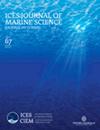在生态系统模型中将气候压力因素与生态过程联系起来,以阿拉斯加湾为例进行研究
IF 3.4
2区 农林科学
Q1 FISHERIES
引用次数: 0
摘要
随着气候压力因素对全球海洋生态系统和渔业的影响,包含环境变量的生态系统模型越来越多地被用于为基于生态系统的渔业管理提供信息。围绕气候压力因子与这些模型中的生物过程之间的机理联系所做的假设非常重要,但很少探讨捕获哪些压力因子以及它们如何影响模型中的生物过程对模型结果的影响。利用阿拉斯加湾的全生态系统模型(亚特兰蒂斯),我们探讨了捕捉物理(温度升高)和生物地球化学(低营养级生产力下降)气候压力源的影响,并分离了每种压力源对觅食鱼类、底层鱼类和食鱼海鸟生产力的影响。然后,我们检验了温度驱动的生境决定和生物能的替代模型规格的影响。温度升高会导致成年体重增加和自然死亡率升高,而生产力降低会导致成年体重下降和自然死亡率升高。运动和产卵的温度依赖性的模型规范影响了模型结果,而将这些过程与温度脱钩会导致过于乐观的生物量预测。随着使用生态系统模型为渔业管理提供信息的操作性越来越强,我们说明了围绕气候压力因素与生态过程之间联系的假设会影响模型结果。本文章由计算机程序翻译,如有差异,请以英文原文为准。
Linking climate stressors to ecological processes in ecosystem models, with a case study from the Gulf of Alaska
As climate stressors are impacting marine ecosystems and fisheries across the world, ecosystem models that incorporate environmental variables are increasingly used to inform ecosystem-based fisheries management. The assumptions around the mechanistic links between climate stressors and the biological processes in these models are important, but the implications for model outcomes of which stressors are captured and how they affect modeled biological processes are seldom explored. Using a whole-ecosystem model (Atlantis) for the Gulf of Alaska, we explore the effects of capturing physical (increased temperature) and biogeochemical (decreased low trophic level productivity) climate stressors, and disentangle the effects of each stressor on the productivity of forage fish, groundfish, and fish-eating seabirds. We then test the effects of alternative model specifications of temperature-driven habitat determination and bioenergetics. Increased temperature resulted in increased weight-at-age and higher natural mortality, while decreased productivity resulted in decreased weight-at-age and higher natural mortality. Model specification of temperature dependence of movement and spawning influenced model outcomes, and decoupling these processes from temperature led to overly optimistic biomass predictions. As the use of ecosystem models to inform fisheries management becomes more operational, we illustrate that the assumptions around the links between climate stressors and ecological processes influence model outcomes.
求助全文
通过发布文献求助,成功后即可免费获取论文全文。
去求助
来源期刊

ICES Journal of Marine Science
农林科学-海洋学
CiteScore
6.60
自引率
12.10%
发文量
207
审稿时长
6-16 weeks
期刊介绍:
The ICES Journal of Marine Science publishes original articles, opinion essays (“Food for Thought”), visions for the future (“Quo Vadimus”), and critical reviews that contribute to our scientific understanding of marine systems and the impact of human activities on them. The Journal also serves as a foundation for scientific advice across the broad spectrum of management and conservation issues related to the marine environment. Oceanography (e.g. productivity-determining processes), marine habitats, living resources, and related topics constitute the key elements of papers considered for publication. This includes economic, social, and public administration studies to the extent that they are directly related to management of the seas and are of general interest to marine scientists. Integrated studies that bridge gaps between traditional disciplines are particularly welcome.
 求助内容:
求助内容: 应助结果提醒方式:
应助结果提醒方式:


